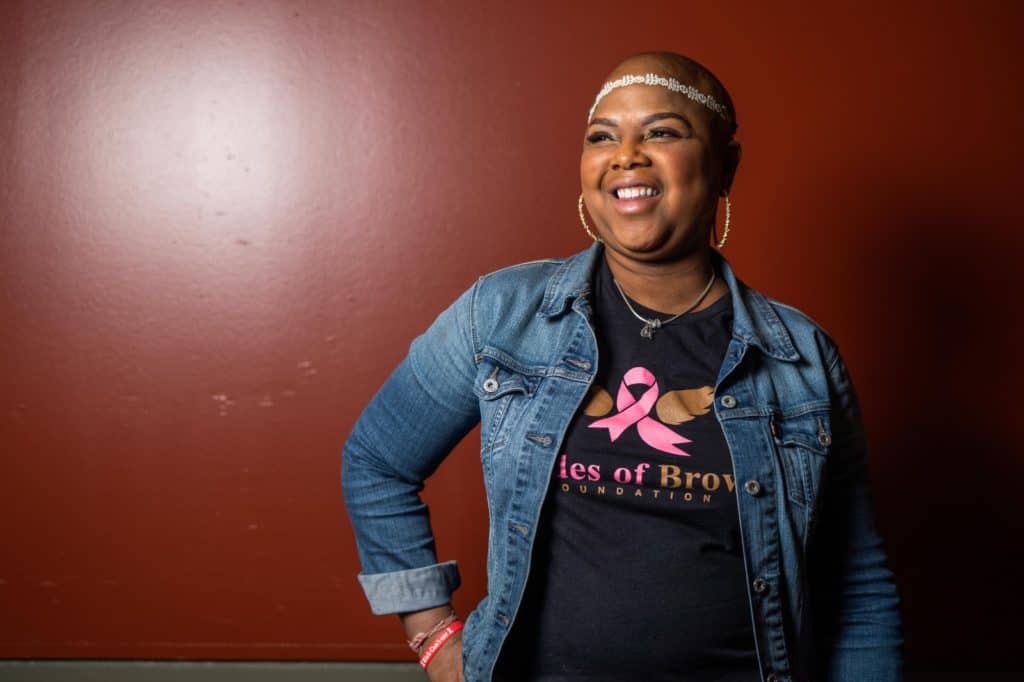
We are sad to share that Sheila Johnson passed away in April 2024.
For anyone in the scientific community, it’s evident that research is the cornerstone to discovery. But the value of research isn’t just measured in breakthroughs or publications. For individuals like Sheila Johnson, it’s about lives saved, extended and improved.
Sheila is more than just an advocate in the breast cancer community. She has been living with metastatic breast cancer (MBC) for 13 years. In Sheila’s own words: “I believe that research is saving my life.”
Sheila’s journey into the realm of breast cancer advocacy is deeply personal. As a Susan G. Komen Scholar and Advocate in Science, she jumped at the chance to sit on the Patient Outreach Committee for ShareForCures, Susan G. Komen’s groundbreaking breast cancer research registry. By empowering people to share their medical data with researchers, those who have or had breast cancer can contribute to a larger pool of information to significantly advance cancer research and spearhead more effective treatments.
And for Sheila, being a part of launching ShareForCures meant far more than simply sitting on another committee. ShareForCures represents a platform where the patient perspective can finally shine, Sheila says, emphasizing that their diverse experiences and data are invaluable in the search for breast cancer cures.
Bridging the Gap: Research and the Black Community
One cannot overlook the inequities in the health care system, especially in the realm of breast cancer. “Black women in the U.S. are about 40% more likely to die of breast cancer than white women,” Sheila notes. Yet, Sheila believes that organizations like Komen can serve as trusted partners that share resources for communities that have been historically marginalized. And to make a significant impact, the key is in building trust and leveraging existing resources and advocates, Sheila says.
“Many times in the Black community, we don’t talk about breast cancer. We don’t talk about our health,” Sheila says. “That’s why I always point out the good work that Komen is doing. Komen is leading the charge in not only research, but giving breast cancer patients support and trusted information.”
To foster trust, Sheila highlights the necessity of grassroots, community-based efforts. By introducing initiatives like ShareForCures to her doctor, her church and other community institutions, Sheila envisions a ripple effect of awareness and trust-building that could pave the way for more substantial involvement from the Black community.
Sheila believes the future of breast cancer treatment and prevention lies in research and has experienced the power of research outcomes firsthand in her own treatment for MBC. Her personal experience with a clinical trial for nearly four years attests to the life-changing benefits that such research can bring.
“Research is important because this is the only way we’re going to find out how to end breast cancer,” Sheila emphasizes. And for research to be effective in finding treatments for all people and one day ending the disease, diverse participation is paramount. The genetics and experiences of the Black community might hold answers, variations or insights that could be critical in finding cures or better treatment options, she explains.
“We need more people to go into the Black community to talk about research, to talk about advocacy and to talk about how important it is to the Black community,” Sheila says. “Our genes are different, and we know this. We need more Black people to participate in research studies.”
Addressing Medical Mistrust
But promoting research in the Black community isn’t without its challenges. A history of medical exploitation and mistrust makes some wary of clinical trials. Sheila acknowledges these valid concerns but also emphasizes the need to shatter prevailing myths.
“Everybody’s story is valid of why they don’t want to participate in a clinical trial or participate in research,” Sheila said. “There are a lot of myths that we need to shut down. We need to stop blaming the Black community and saying that they don’t want to participate in research because of medical mistrust. I would instead ask whether Black patients are really being asked to participate.”
Sheila firmly believes that more work needs to be done to ensure Black patients are educated, asked and given the opportunity to participate in research.
ShareForCures represents a new frontier in patient-driven research for all people. By sharing data, people can empower researchers to gain insights and draw connections that might have been previously overlooked. For Sheila, participating in ShareForCures isn’t just about aiding her own journey. It’s about the bigger picture — helping the next generation, including her daughter, to live in a world where breast cancer isn’t a looming threat but a preventable or treatable condition.
“If I can be a part of groundbreaking research to help my daughter and to help people around the world, I’m all for it,” she says.
Sheila’s story is a testament to the power of advocacy, the promise of research and the importance of sharing data. With champions like her, the future of breast cancer research shines a little brighter.
When you join ShareForCures, you can help accelerate the search for breast cancer breakthroughs. With thousands of others, you can help make our vision of a world without breast cancer a reality. Learn more about ShareForCures today.



